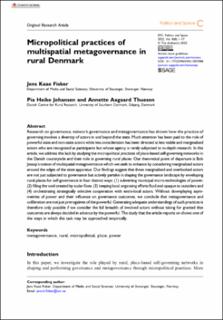| dc.contributor.author | Fisker, Jens Kaae | |
| dc.contributor.author | Johansen, Pia Heike | |
| dc.contributor.author | Thuesen, Annette Aagard | |
| dc.coverage.spatial | Denmark | en_US |
| dc.date.accessioned | 2022-02-11T12:17:49Z | |
| dc.date.available | 2022-02-11T12:17:49Z | |
| dc.date.created | 2021-11-19T13:28:15Z | |
| dc.date.issued | 2022-01 | |
| dc.identifier.citation | Fisker, J.K., Johansen, P.H., Thuesen, A.A. (2022) Micropolitical Practices of Multispatial Metagovernance in Rural Denmark. Environment and Planning C: Politics and Space. | en_US |
| dc.identifier.issn | 2399-6544 | |
| dc.identifier.uri | https://hdl.handle.net/11250/2978474 | |
| dc.description.abstract | Research on governance, network governance and metagovernance has shown how the practice of governing involves a diversity of actors in and beyond the state. Much attention has been paid to the role of powerful state and non-state actors while less consideration has been directed at less visible and marginalised actors who are recognised as participants but whose agency is rarely subjected to in-depth research. In this article, we address this lack by studying the micropolitical practices of place-based self-governing networks in the Danish countryside and their role in governing rural places. Our theoretical point of departure is Bob Jessop’s notion of multispatial metagovernance which we seek to enhance by considering marginalised actors around the edges of the state apparatus. Our findings suggest that these marginalised and overlooked actors are not just subjected to governance but actively partake in shaping the governance landscape by enveloping rural places for self-governance in four distinct ways: (1) subverting municipal micro-technologies of power; (2) filling the void created by scalar fixes; (3) keeping local organising efforts fluid and opaque to outsiders and (4) orchestrating strategically selective cooperation with extra-local actors. Without downplaying asymmetries of power and their influence on governance outcomes, we conclude that metagovernance and collibration are not just prerogatives of the powerful. Generating adequate understandings of such practices is therefore only possible if we consider the full breadth of involved actors without taking for granted that outcomes are always decided in advance by the powerful. The study that the article reports on shows one of the ways in which this task may be approached empirically. | en_US |
| dc.language.iso | eng | en_US |
| dc.publisher | SAGE Publishing | en_US |
| dc.rights | Navngivelse 4.0 Internasjonal | * |
| dc.rights.uri | http://creativecommons.org/licenses/by/4.0/deed.no | * |
| dc.subject | politikk | en_US |
| dc.subject | Danmark | en_US |
| dc.subject | mikropolitikk | en_US |
| dc.subject | makt | en_US |
| dc.subject | lokalpolitikk | en_US |
| dc.title | Micropolitical Practices of Multispatial Metagovernance in Rural Denmark | en_US |
| dc.type | Peer reviewed | en_US |
| dc.type | Journal article | en_US |
| dc.description.version | publishedVersion | en_US |
| dc.rights.holder | © The Author(s) 2022 | en_US |
| dc.subject.nsi | VDP::Samfunnsvitenskap: 200::Statsvitenskap og organisasjonsteori: 240::Internasjonal politikk: 243 | en_US |
| dc.source.journal | Environment and Planning C: Politics and Space | en_US |
| dc.identifier.doi | 10.1177/23996544211057088 | |
| dc.identifier.cristin | 1956484 | |
| cristin.ispublished | false | |
| cristin.fulltext | original | |
| cristin.qualitycode | 1 | |

